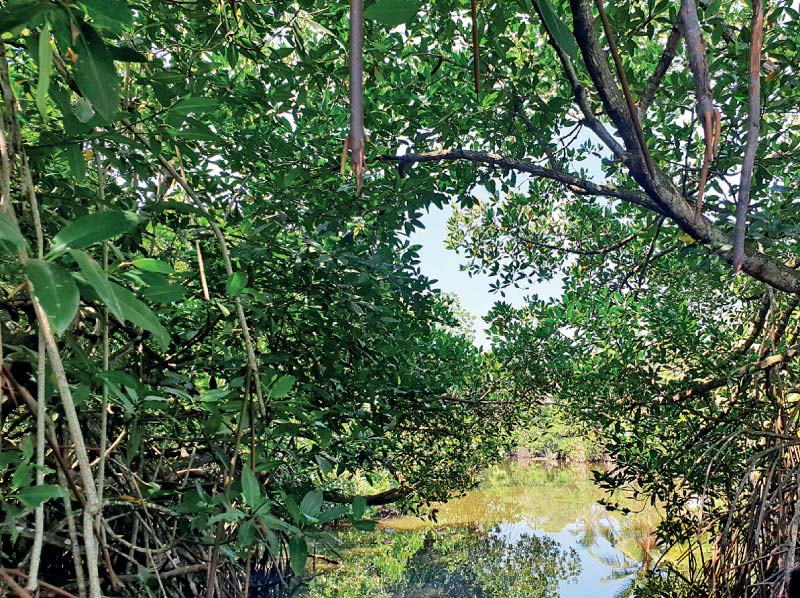Wednesday Feb 18, 2026
Wednesday Feb 18, 2026
Friday, 11 March 2022 02:32 - - {{hitsCtrl.values.hits}}

 The new IPCC report on climate change recognises and highlights “the interdependence of climate, ecosystems and biodiversity, and human societies.” It is important to understand this fact and its implications, which are far-reaching and complex.
The new IPCC report on climate change recognises and highlights “the interdependence of climate, ecosystems and biodiversity, and human societies.” It is important to understand this fact and its implications, which are far-reaching and complex.
Climate change is a defining global crisis of our times, but it is not taking place in isolation. Biodiversity loss, unsustainable use of natural resources, land degradation and desertification, ecosystem deterioration, the need for the eradication of poverty and sustainable development, and the COVID-19 pandemic are all global crises that affect individuals, societies, and economies while also interacting with each other. None of them can be fully understood without knowledge of the others, and none can be solved completely on its own.
An interconnected world
The Intergovernmental Panel on Climate Change, IPCC for short, is the world’s most authoritative body on climate science. It compiles and synthesises the most up-to-date research findings from thousands of scientists and research institutions across the globe and publishes it in comprehensive assessment reports or special thematic reports. The latest of these publications is the second working group of the Sixth Assessment Report, which was released in late February. This compendium on climate impacts, vulnerabilities, and adaptation highlights the interconnectedness of climate change, natural ecosystems, and human society.
Climate change impacts ecosystems and biodiversity, which in turn impacts the provision of livelihoods and ecosystem services to human communities, adding to other climate impacts which are directly affecting humans. However, the relationship between these different systems is not one-directional or one-dimensional. Human activities produce greenhouse gas emissions that cause and accelerate climate change, but human actions can also help us adapt to climate-related impacts and the conservation of ecosystems. Similarly, ecosystem degradation contributes to climate change and releasing carbon stocks, while healthy ecosystems can support mitigation and adaptation and increase the resilience of natural and human systems alike.
This interconnectedness of different systems makes it harder to understand climate change in isolation, but it unlocks a world of synergies and co-benefits when studied in a holistic way. The 3,700 pages of the new IPCC report are therefore littered with references to “cascading and compounding impacts,” “coupled systems,” and their interactions and interlinkages. The report also specifically focuses on certain ecosystems in several chapters, including terrestrial and freshwater ecosystems, oceans and coastal ecosystems, tropical forests, deserts, and biodiversity hotspots.
Insights from the IPCC report
What does this interconnectedness mean, and how does it manifest in practical terms? The IPCC report offers a number of key insights and lessons on this topic:
The increasing frequency and intensity of climate and weather extremes—such as heat waves and high temperatures, heavy rains, droughts, and wildfires—have already severely impacted natural ecosystems and will continue to do so. This includes both terrestrial ecosystems, freshwater ecosystems, and ecosystems along coastlines and in the open ocean, which are suffering from ocean warming, acidification, and coral bleaching events. Forests, coral reefs, and coastal wetlands are among the most endangered ecosystems threatened by climate change and non-climatic impacts.
The observed damages and losses to natural ecosystems are larger than previously estimated. This leads to the loss of ecosystem services and functionality, which in turns affect the resilience and adaptive capacity of both ecosystems and human communities depending on them. Approximately half of assessed species are shifting their habitats, while hundreds of other species have suffered local losses or mass mortality events. There are already impacts that are irreversible, such as the extinction of species, and ecosystems that are reaching hard limits of adaptation, such as warm-water coral reefs and polar regions.
Climate impacts affect people and ecosystems on a vast scale around the globe. The IPCC report estimates that approximately 3.3 to 3.6 billion people as well as a high proportion of all animal and plant species live in contexts that are highly vulnerable to climate change. Human and ecosystem vulnerability are interdependent, and unsustainable development patterns, deforestation, habitat fragmentation, pollution, and land use changes can increase the exposure of both to climate hazards.
Key learnings and takeaways
The IPCC report states that the “future vulnerability of ecosystems to climate change will be strongly influenced by the past, present, and future development of human society,” and vice versa. As outlined throughout the different chapters, “Biodiversity loss, and degradation, damages to and transformation of ecosystems are already key risks for every region,” but there is still time and scope to manage these risks and protect ecosystems as well as human communities.
Going forward, it will be unavoidable to invest in the conservation, protection, and restoration of different ecosystems, natural environments, and species. Targeted management together with adaptation measures can enhance the resilience of ecosystems, for example by increasing the size of their natural area, restoring degraded areas, and reducing climatic and non-climatic stressors. However, such interventions need to be responsive to ongoing changes and new evidence to become truly effective and “reduce a range of climate change risks to people, biodiversity, and ecosystem services with multiple co-benefits.”
The IPCC reports on climate science help us to better understand the challenges faced by human societies over the next decades and centuries. Long-term climate resilience must be built upon a solid foundation of data and evidence, and any transformative climate action needs to acknowledge and incorporate natural ecosystems as well as socioeconomic and cultural factors.
(The writer works as Director – Research and Knowledge Management at SLYCAN Trust, a non-profit think tank based in Sri Lanka. His work focuses on climate change, adaptation, resilience, ecosystem conservation, just transition, human mobility, and a range of related issues. He holds a Master’s degree in Education from the University of Cologne, Germany and is a regular writer to several international and local media outlets.)